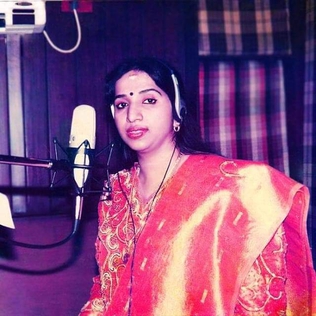Early life
Abhijeet was born in a Bengali middle-class family in Kanpur on 30 October 1958, the youngest of four siblings. He passed his matriculation from Ramakrishna Mission Higher Secondary School, Kanpur and Class XII from BNSD Inter College Chunni Ganj, Kanpur; and graduated in commerce (B.Com.) from Christ Church College, Kanpur in 1977. He started singing on stage in 1970 onwards. Although his parents were against the idea, he went against their wishes and became a singer. He is an established singer in Bollywood, having done extensive playback singing for actor - Shahrukh Khan; among many others. Nowadays, he also appears as a judge in reality shows based on singing contests on TV. He has interest to play cricket most of evening time during schooling days.
| Abhijeet Bhattacharya | |
|---|---|
| Birth name | Abhijee |
| Born | 30 October 1958.Kanpur, India (age 52) |
| Genres | Bollywood, regional filmi playback |
| Occupations | Singer |
| Years active | 1985–present |
Career
Abhijeet left home for Mumbai in 1981 to study Chartered Accountancy. Due to his fascination for singing and music, he decided to pursue a career in playback singing and quit Chartered Accountancy. Despite being gifted with a melodious voice, he struggled for a long time.
After his long struggle in Mumbai, he received a call from Rahul Dev Burman to sing for Dev Anand's sons debut film. Abhijeet idol is Kishore Kumar.
In the 1990s, Abhijeet established himself as a notable playback singer. His first notable hits were the songs from the film Baaghi, composed by Anand-Milind - Ek chanchal shokh hasina, Chandni raat hai and Har kasam se badi hai. Then in 1994 when he gave hits in movies like Yeh Dillagi, Anjaam, Raja Babu and Main Kihildi Tu Anari.. there was no looking back.. He became a hit machine along with his competitors Kumar Sanu and Udit Narayan he was among the top 3 play back singers of 90s and finally won the Filmfare Best Playback singer Award for Yes Boss in 1997. He went on to give hit numbers in the movies Baadshah, Yes Boss, Dilwale Dulhaniya Le Jayenge, Josh, Dhadkan, Chalte Chalte, Main Hoon Na and many others.
Some of his songs such as Kurta phaadke from Anari No. 1 did not do well with the public.
Abhijeet has given his voice for actors such as Shahrukh Khan, Sunil Shetty, Jackie Shroff, Anil Kapoor, Akshay Kumar, Govinda, Sanjay Dutt, Sunny Deol, Saif Ali Khan, Bobby Deol, Salman Khan, Aamir Khan, Hrithik Roshan, Ajay Devgan, among many others.
He was recently seen as a Judge in a reality show called Star Voice of India. He now judges a show called "Ek Se Badkhar Ek".
Non-film music
After his success in playback singing, Abhijeet decided to try non-film pop music. He released two albums, Main Deewana Hoon and Tapori No.1. The albums did not achieve commercial success. Later he launched Aashiqui, which was appreciated by the audience. Recently, he has launched a pop album, called Tere Bina, whose songs and videos are chartbusters.
On May 3, 2006, he released another non-film album called Lamhe, which was well-appreciated. Currently Abhijeet is a judge on the Sa Re Ga Ma Pa - Little Champs show. He is one of the best singer of contemporary India.
Notable songs
Dil Tujhpe Aa Gaya—1991 -Dil Hai Ke Manta Nahin
Ole Ole -94 - Yeh Dillagi
Main Khiladi Tu Anari -94 (title track) - Main Khiladi Tu Anari
Haan mujhe pyaar hua pyaar hua allahmiya- Judaai
Zara sa Jhoom loo main -95 - Dilwale Dulhaniya Le Jayenge
Wada Raha Sanam -92 - Khiladi
Darwaza Band Karlo -93 - Darr
Meri Jaane Jaana- Mohabbat
Woh Ladki Jo Saab Se - Baadshah
Title song - Baadshah
Tum aaye to -2000 - Phir Bhi Dil Hai Hindustani
I'm The Best - Phir Bhi Dil Hai Hindustani
Kuch to Baata - Phir Bhi Dil Hai Hindustani
Tauba Tumhare Ye Ishare -2003 - Chalte Chalte
Suno Na - Chalte Chalte
Title Song - Chalte Chalte
Chaand Taare -97 - Yes Boss
Main Koi Aisa Geet - Yes Boss
Title Song[Sad]-2004 - Main Hoon Na
Mere Khyaloon Ki Malika -2k - Josh
Tum Dil Ki Dhadkan -2k - Dhadkan
Roshini Se - Asoka
Raat Ka Nasha - Asoka
Aye Nazaneen - Dil Hi Dil Mein
Teri ankhen jhuki jhuki -96 - Fareb
Shaher Ki ladki - Rakshak
Jhanjhriya - Krishna
Pyaar Se Pyaar Hum Ab To Karne Lage -01-Raaz
Ishq chupta nahin chupaane se - Bewafaa
Aisa koi zindagi mein aaye - Dosti
Tan tana tan tan tara—98 - Judwaa
Sandesa Aya, Jab Tak Hai Saans, Kabhie Kabhie Sapne - Kaafila
Dhoom Taana -07 - Om Shanti Om
Dil le le-Khiladi 420
Yeh Dillagi—94-Yeh Dillagi
Koi nahi tera jaisa-Keemat
Main rahu naa rahu meri aawaz -2006-lamhe
Ek Chanchal Shook Haseena -90-BAGHI
Deewana Deewana Main Tere Liye-Daraar
Lamha Lamha Doori -06-Gangster
Badi Mushkil Hai -94-Anjaam
Ah a e O oh O -94-Raja Babu
Itna mujhe pata hai - Khiladiyon Ka Khiladi
Bharo meri mang baro - Sabse Bada Khiladi
Jab tak rahega samosa main aloo - Mr. and Mrs. Khiladi
Maine to khai kasam - Awara Paagal Deewana
Tumhain kaise main batoo-Dastak
Aankhon main base ho tum-Takkar
Awards
Filmfare Best Male Playback Award (1997) for Main Koi Aisa Geet Gaaon (Yes Boss)
Screen-Videocon Award for the best singer in 1997 for Chand taare in Yes Boss
MTV Life Time Achievement Award.
Uttar Pradesh Gaurav Samman
Personal life
Abhijeet is married to Sumaati. The couple have two sons.
















